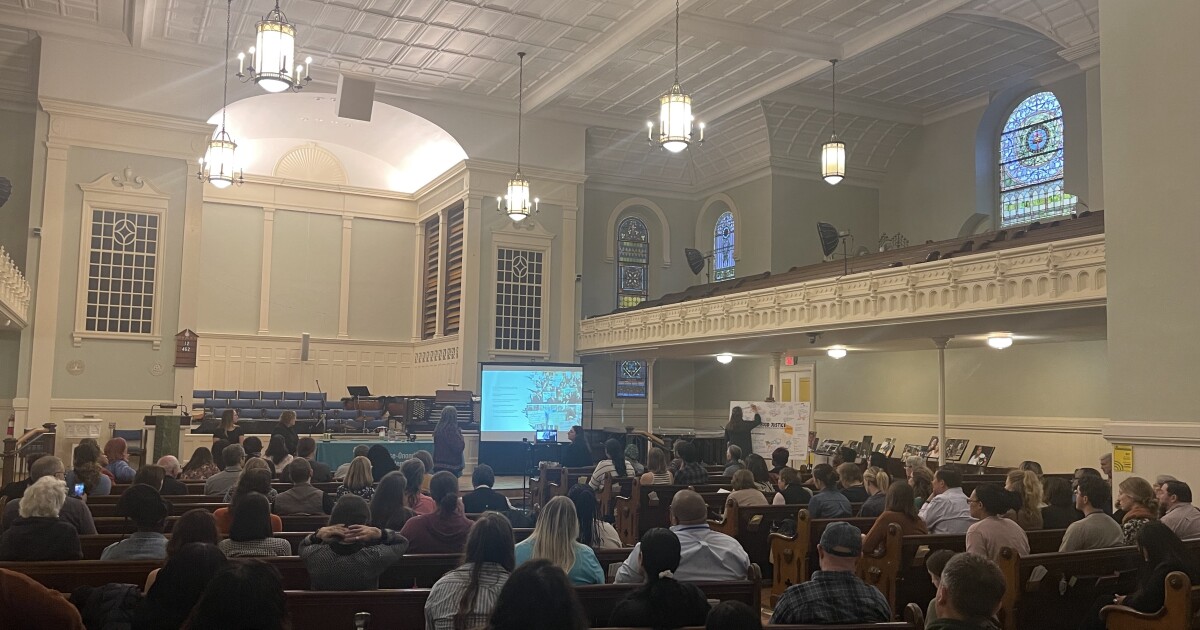Community leaders and lawmakers were among the dozens who gathered for the first annual Food Justice Gathering this weekend, to brainstorm how to help some of the most vulnerable in the area.
The event was hosted by the Plymouth Congregational Church, and featured discussions on food deserts, especially in predominantly Black neighborhoods; protecting local indigenous agriculture; and expanding immigrant food cultures. Demonstrations on seed planting and cooking were also held, to help increase self-sufficiency.
Another focus of the gathering was creating collaborations. Event co-organizer Maura Ackerman heads the Syracuse-Onondaga Food Systems Alliance (SOFSA), an independent food policy group, and says the local community is small enough that seeking out federal funding — like from the USDA — should be a joint effort.
“We can turn this model where it’s every person and every organization for themselves on its head and say, ‘How do we collaborate better? How do we coordinate our resources?’ How do we say, ‘Let’s actually apply for this grant together?’ Because if we apply for it together, we’re going to get it. And if we apply for it apart, maybe only of us will,” Ackerman said.
Ackerman says the region also has some of the best soils in the country, and will play an increasingly larger role in national agricultural continuing production due to climate change, which is another reason she wants to see more collaborations that can boost local food systems, those activities and outcomes related to producing and consuming food.
But consumption often isn’t a choice, says Reverend Eric Jackson, the pastor of Plymouth Congregation Church, especially when it comes healthy food.
“When I say healthy…we’re not just talking about putting a few tomatoes in your system, but having access to food that’s going to help your body get what it needs,” said Jackson. “When your body doesn’t get what it needs, it affects your health and, ultimately, your capacity to even be able to economically thrive. So food is very much at the heart of so much injustice and we don’t even realize it.”
For long-time community activist and event co-organizer Mable Wilson, food insecurity is inextricably tied to all major social problems.
“We care about social justice, housing justice, food justice,” said Wilson, “[but] we can’t have food justice if you don’t have a decent place to live.” As for social justice, she says that can only improve if disenfranchised people are educated on the right to vote.
Still, Wilson says she’s encouraged by the growth of the local food justice movement over the past two decades, and she says she’s already thinking about next year’s Food Justice Gathering, and how it can include more churches and more elderly Syracusans.
Urban farmer Karen Washington, a New York City-based activist considered to have coined the phrase ‘food apartheid,’ is also thinking about the future. She says she wants to see “more interaction and more outrage and more activism, instead of complacency” over why so much food in a country as wealthy as the U.S. doesn’t make it to the people who need it most.
However, Washington was heartened by what she saw at the gathering: “I felt that was very, very good for a first conference, I see the anticipation for many, many more as people [spread the] word about how important it is to gather within communities and to be transparent, and make sure that communities are heard.”
